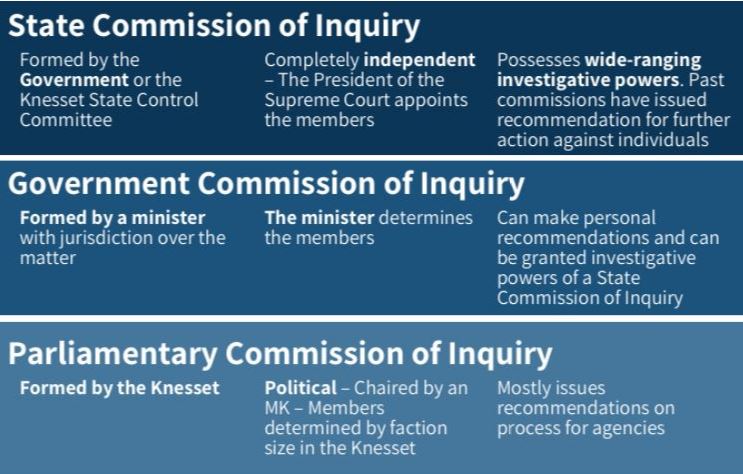What's A Commission of Inquiry? Explainer
The Israeli government recently announced its intention to establish its own commission of inquiry into the events of October 7, 2023, rather than forming a State Commission of Inquiry—the most authoritative, independent, and legally empowered investigative mechanism under Israeli law. As Dr. Dana Blander, a research fellow at the Israel Democracy Institute, explains, Israel’s legal framework provides for several types of investigative commissions, each differing in its degree of independence, statutory authority, and public legitimacy. Notably, the government’s recent decision does not establish a State Commission of Inquiry—the appropriate and legally grounded institution for investigating the events of October 7—nor does it create a governmental commission of inquiry. Instead, it proposes a vague, ad hoc body seemingly tailored to serve specific political interests rather than the public need for a credible and impartial investigation. This explainer outlines the existing commissions - as more information comes to light about the government's planned commission, additional analysis will be provided.

A Government Commission of Inquiry is established by virtue of section 8A of the Government Law, 5761 2001, which states that a minister may appoint a committee to examine a particular issue or event that is within his area of responsibility, and determine that such a committee will be headed by a retired judge. Since the Minister who established the committee is the Minister of Defense, the committee will submit the report to him.
At the request of the minister who appoints the commission, and with the approval of the Government, the Minister of Justice may determine that a government commission of inquiry shall have the powers of a State Commission of Inquiry. If these steps do not take place, the powers granted to the government commission of inquiry are more limited.
Once the work of the commission is complete, it compiles a report and presents it to the Government. This report may include personal recommendations about individuals it investigates, but the Government does not have to act upon these recommendations. Past precedents indicate that governments do not ignore the recommendations of such a commission.
One recent example of such a commission is the Winograd Commission, which was established to investigate after the 2006 Second Lebanon War. Unlike the current commission, the Winograd commission was granted the powers of a state inquiry commission.
The most serious type of commission is a State Commission of Inquiry, which is an independent committee that is charged with conducting a quasi-judicial procedure. It is set up either by a government decision, or by the Knesset State Control Committee following a report by issued by the State Comptroller. The President of the Supreme Court then appoints the members of the commission [by virtue of the Commission of Inquiry Law 5768-1968]. Such a commission has broad powers including the ability to call witnesses and to compel them to testify if they refuse. This commission's report, and the testimony provided during the inquiry, shall also not be used as evidence in legal proceedings.
The advantage of a State Commission of Inquiry is the breadth and depth of the inquiry it conducts, as well as the entrenched practice that the commission makes recommendations that can be both personal and systemic, and that governments not tend to ignore its recommendations, especially ones that are produced against individuals.
Governments do not tend to voluntarily set up state commissions of inquiry unless they see it as a means of calming public outrage during a crisis. Examples include the Sahmgar Commission that probed the evets leading up to the assassination of Prime Minister Yitzhak Rabin, the Agranat Commission after the Yom Kippur War; the Cohen Commission of the Sabra and Shatila massacre; and the Or Commission following the violent events of October 2000.
